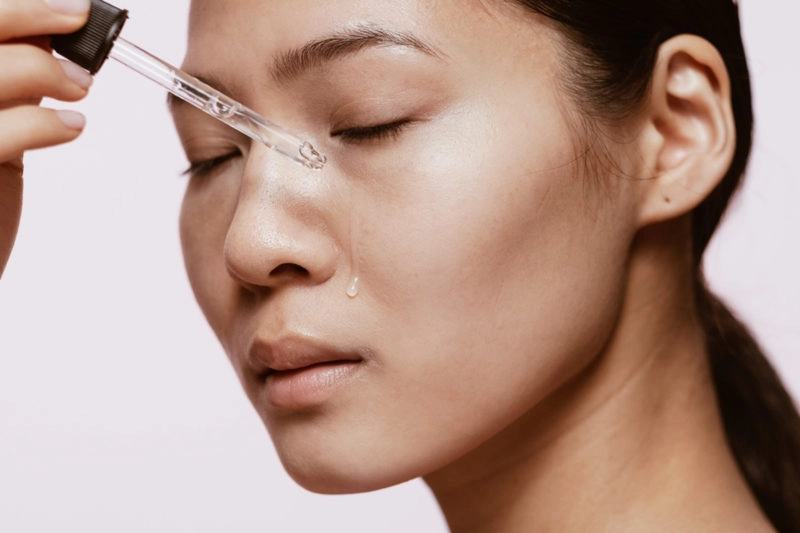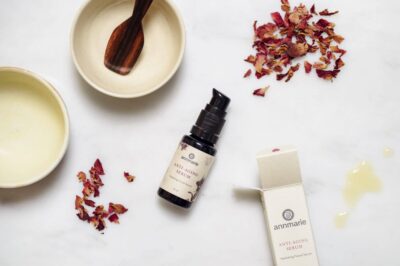Table of Contents[Hide][Show]
Ordinary skin care goes as follows; cleanse, moisturize, then sunscreen (in the a.m). But if you want to add that extra glow into your skin, you should consider adding a face serum into your skin care routine. Even though we all fancy minimalism, who doesn’t want skin as clear as glass?
There are so many things you might be asking yourself about serums, and we are here to answer them all to help you grasp what serums are.
What Is A Face Serum?

A serum is a translucent aloe-based or aqueous solution that is lighter than a moisturizer or facial oil. You should apply your serum after cleansing and before applying your facial oil. A serum’s primary purpose is to deliver active ingredients directly into the skin. Serums contain tiny molecules that easily penetrate the skin, providing a high concentration of active ingredients to target your skin concern.
Because serums contain various active ingredients, you can target multiple skin concerns like reducing the appearance of wrinkles, dullness, discoloration, and fine lines. To reap the maximum benefits of this nutrient-dense product, you’ll need to use a facial oil as the following step after the serum to help seal in the moisture.
Face Serum or Moisturizer First?
After cleansing, a face serum is used, followed by a moisturizer (or facial oil), then sunscreen. Because serums are aqueous-based and oil is water repellent, putting the serum on first, then layering your facial oil on top will help drive the serum’s ingredients (and all of its benefits) deeper into the skin and allow the moisturizer to act as a seal. The concept of a serum is simple—it’s a product in your ritual that is extremely targeted for any skin concerns and delivers deep hydration to the skin for a more plump and youthful look. Serums can be rich, but would not be classified as oils or moisturizers. They can also be presented as a more water-y formula, but would not be classified as an essence.
Benefits of Face Serums
Face serums are great for targeting different skin concerns, while also delivering a ton of nutrients for a healthy-looking glow.
1. Hydrates skin making it look plump and youthful

To maintain beautiful skin, hydration is vital. If you feel like your skin is a little bit dehydrated, adding a serum into your routine will be a better option than relying solely on your moisturizer.
Serums that contain active ingredients like hyaluronic acid or squalane are great for hydration. Hyaluronic acid in serums will help your skin lock in moisture to keep it looking smooth and glowing. To maximize the effectiveness of your serum, apply it on damp skin and seal it in with a facial oil for maximum benefits. If you have struggled with dull and dry skin, then a serum should be included in your skin care routine.
If you have oily skin, you will have to experiment to see what works best for you—some people with oily skin can get away with skipping the moisturizer, or benefit from using our Herbal Facial Oil for Oily Skin.
2. Soothes sensitive skin
Since serums are lightweight, they readily absorb into the skin and are great for people with oily skin. Active ingredients like probiotics and white willow bark (which contains salicin, the derivative of salicylic acid) help manage oilier skin types.
3. Reduces the appearance of wrinkles and fine lines
Face serums with active ingredients like our Bioactive A-Complex, hyaluronic acid, or vitamin C (all found in our Concentrated Boosting Elixirs) may reduce the appearance of fine lines and wrinkles. Hyaluronic acid helps the skin attract and retain moisture. When the skin is looking plump and hydrated, you will no longer be able to see the fine lines of aging.
Vitamin C is a tremendous anti-aging compound. It helps the skin combat the negative effects from environmental stressors. It is also a brightening agent that will leave your skin looking even-toned and illuminous. Besides the strength it offers, vitamin C also hydrates the skin without leaving behind a greasy film.
An anti-aging face serum that contains rosehip oil will help your skin feel firmer and softer. Anti-aging serums are suitable to apply at night before bed or in the morning before applying your facial oil for maximum benefits.
Other ingredients to look out for include jojoba oil, goji berries, and chia seed oil. According to several studies, all of these ingredients are full of antioxidants—which lead to restoring the skin. Finding a facial product that features these ingredients means you will have firmer, smoother, wrinkle-free, and radiant-looking skin.
4. Protects skin with antioxidants
Serums containing ingredients like vitamin E, ferulic acid, vitamin C, probiotics, green tea, astaxanthin, and resveratrol help protect the skin from environmental stressors and pollutants that contribute to premature skin aging and wrinkles.
- Smoothes skin and refines texture: Serums that feature ingredients like vitamin C, hyaluronic acid, and peptides help smooth skin and refine the appearance of skin texture.
Minimize dark spots appearance: Vitamin C, Bioactive A-Complex, citrus-derived stem cells, and herbs such as licorice or uva ursi help brighten the skin, as they create an even, glowing complexion.
5. Reduces the appearance of skin redness or irritation
You predominantly suffer from irritation, redness, and itchiness if you have sensitive skin. Such delicate skin won’t be equipped using a facial oil alone since pollution and long sun exposure could cause havoc on the skin. Ingredients like squalane, aloe vera, shea butter, and zinc are great for soothing the skin as they are deeply hydrating and can tackle dryness. Other ingredients to look out for are avocado oil and sunflower oil, which are great for soothing sensitive skin.
6. Reduces the appearance of pore size
Most people with oily skin tend to have visible pores. Because face serums can contain a high dose of antioxidants or exfoliating ingredients like our bioactive A-Complex, they can help clear out dirt and unclog pores. Then, there are ingredients like vitamin C, which can tighten visible pores, making them unnoticeable. Face serums are also lightweight, and thus, easily absorbed into the skin, which additionally prevent clogging of the pores. If your goal is to minimize the appearance of large pores, look for a lightweight serum with exfoliating ingredients.
7. Unclogs pores and balances natural oils
If you have oily skin and are afraid of incorporating a face serum that has moisturizing effects, look for a serum with ingredients that are tailored for your skin type.
The right face serum won’t cause your skin to be more oily. You should check for ingredients like salicylic acid (or willow bark, which is where salicylic acid is derived from), neem, and black cumin seed oil if you have an oilier skin type, as these ingredients help balance the natural oils of your skin to reduce shine.
What Does Serum Do For My Skin?
Anti-Aging Serum
This versatile, aloe vera-based serum provides active nutrients for all skin types, firming and tightening the appearance of aging skin. Hyaluronic acid hydrates, while the herbal extracts buddleja davidii and edelweiss protect skin from environmental stressors. Life everlasting flowers soothe and refresh.
A serum’s primary function is to hydrate the skin, but it also serves a variety of purposes. Finding the right serum depends on what you are looking to achieve with your skin and what your skin’s needs are. Serums are formulated with different types of active ingredients to deliver nutrients and target one or many skin concerns. Read below to see some of the skin issues certain ingredients often found in serums can help overcome!
1. Temporary redness
Look for vitamin C (reduces temporary redness and is an antioxidant that helps fight against outdoor elements), lactic acid (unclogs pores), Bioactive A-Complex (soothes skin), zinc (balances natural oils), and niacinamide (calms skin and reduces the appearance of temporary redness).
2. Wrinkles
For anti-aging properties (or aging gracefully), hyaluronic acid is an ingredient you should look out for in serums. It is extremely hydrating and helps the skin retain a plump, youthful appearance.
3. Dryness
To prevent dryness, look for a serum with ingredients like hyaluronic acid (retains moisture), vitamin B5 (hydrates and soothes skin), ceramides (retains moisture), lactic acid (exfoliates and brightens dull, lackluster skin), and vitamin E (protects skin from environmental stressors).
4. Unhealthy looking skin
For an overall healthier-looking glow, look out for ingredients like peptides (firms and brightens skin), vitamin C (evens out skin tone), and kojic acid (brightens the appearance of skin).
5. Dullness
Ingredients like ferulic acid, green tea extract, and resveratrol in serums work by shielding the skin from damaging outdoor elements and promoting rejuvenation.
It is necessary to remember that even though serums are beneficial, they should not be piled on, as an excessive amount of these active ingredients could irritate the skin. Minimalism is key here. We also recommend patch-testing before applying any product to your face, especially so if you have sensitive skin.
Conclusion
Face serums are neither too thick nor too thin in texture and are easily absorbed into the skin to assist with whatever skin concerns you are looking to address. You can use face serums for a magnitude of purposes, from reducing the look of aging and wrinkles to hydrating and brightening. You can use different face serums at different times (day or night); always read the instructions for best results and remember to patch-test.
Frequently Asked Questions
1. What is the right age to use face serums?
If possible, it is better to start using face serums in your 20s and early 30s. Using a serum later on in life will still yield great results; however, we find that starting when you are younger can have an even greater and longer-lasting effect at preventing the early onset of aging skin.
2. Must I have face serums?
Serums quickly absorb into the skin delivering a high concentration of nutrients to help keep your skin looking healthy. Because of how easily they can deliver these active ingredients, serums are a great tool to target various skin concerns like the appearance of wrinkles, fine lines, and temporary redness. With the right serum on hand, you can keep some of the harsh signs of aging at bay.
3. Do face serums clog pores?
No, they don’t. Serums are lightweight products that quickly absorb into the skin due to their small molecules. Because of how thin they are, they hydrate the skin without clogging the pores. If your serum clogs your pores, it could mean that you have used a serum that wasn’t optimal for your skin type. Oily serums or serums with high amounts of exfoliants and acids can cause such issues. To find a product that is right for you, check out our collection of face serums made with non-toxic ingredients for a serum that best fits your needs.
4. Does face serum cause pimples?
No. Face serums are aqueous-based formulas that deliver hydration and contain active ingredients to target various skin issues, especially those that arise from clogged pores or poorly maintained oily skin. When choosing a face serum, ensure it has the right ingredients for your specific skin issues.
References









Leave a Reply